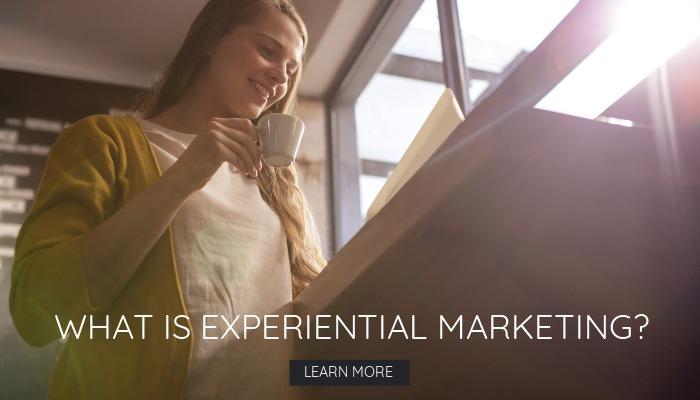What Is Experiential Marketing: A Closer Look at A Rising Trend
While certainly, we live in a digitally-driven world and marketing as such generally tends toward the digitally-friendly, there is still most definitely a place for experiential marketing. Call it old school, call it sense-friendly, call it interactive, experiential marketing is about unique interactions designed to build brand awareness and in this way extend your company’s overall reach. If done correctly, know that experiential marketing can have a profound impact. After all, it enables you to forge truly meaningful connections, such that become the basis for building long term customer relationships.

Authenticity, even more so now than ever before, is becoming that which consumers are looking for when deciding whether or not to go with one company over another. And with experiential marketing techniques, you optimize your opportunity to demonstrate not only your authenticity but also your overall relatability. In other words, it’s a crucial moment in which you get to connect with the customer face to face.
Table of contents:
- ● What Is Experiential Marketing: A Closer Look at A Rising Trend
- ● Feel it to believe it
- ● What is Experiential Marketing: Beyond Face to Face
- ● Experiential Marketing Builds Brand Awareness
- ● Make sure those who are representing you have talking points.
- ● This Form of Marketing it Not Intrusive
- ● Experiential marketing is becoming a preferred means of engaging people.
- ● With Experiential Marketing You Can Make a Great First Impression
- ● You Have the Chance to Tell Your Stories
- ● A live event is a great platform for any company.
- ● Experiential Marketing Helps Drive Word of Mouth Sales
- ● Given social media channels word of mouth is even more powerful.
- ● On average someone will spread the word to nearly 20 others.
- ● At the actual event, participants are likely to go on social media.
- ● This also helps with feedback.
- ● Free samples are always a good thing.
- ● This Kind of Marketing Engages the Senses
- ● Get creative with sensory engagement.
- ● With Experiential Marketing You Can Change Perceptions
- ● Purchases are emotional decisions.
- ● It’s not reinventing the wheel!
Feel it to believe it
The other benefit of this type of marketing plan: you get firsthand access to customer reactions. Feedback can be everything. Especially if launching a new product, testing out a new flavor, what have you, gaining those in-the-moment consumer insights can prove immensely helpful moving forward. If you need to adjust, make significant changes, come up with a new plan in general, this is the feedback you need to make such decisions.
Experiential marketing is all about interaction—allowing potential customers to experience what your brand embodies in a way that strictly digital advertising and/or marketing cannot accomplish. This in turn also lends itself to a greater feeling of trust on the customer’s part. You are being forthcoming, you’re giving them direct access, you’re not holding back or hiding anything. Not only does this help check the box for trust, but it truly does lay the foundation for a future long term relationship with that customer.
What is Experiential Marketing: Beyond Face to Face
While certainly experiential marketing does encompass face to face events and situations, its scope can also be a bit broader. In other words, it is a holistic approach/understanding to live marketing in general. This can include the lead-up as well as follow up to the interaction you are staging. Yes, it generally is about the physical setting and consequent experience therein, but it is also about the other components necessary to make it happen and ultimately, make it an effective endeavor.
Because it is a more dynamic marketing approach than say sending out an email blast or utilizing your social media channels, experiential marketing presents a number of benefits that the more digitally-dependent methods simply cannot. Below are a few of the key benefits of integrating an experiential marketing strategy and how it can help boost your business’s brand.

Experiential Marketing Builds Brand Awareness
Generating a buzz around that brand is necessary for any company looking to gain traction and increase their market share. So how exactly does this type of marketing strategy enable you to cultivate enhanced brand awareness? Most who attend live or in person events say that they gain an overall better appreciation for what a brand is and what its products are like. There is a hands-on component that will leave an indelible impression and in creating such an impression, a brand makes itself far more memorable.
Make sure those who are representing you have talking points.
While certainly you don’t want to sound overly rehearsed, you do want your brand ambassadors to cover all key points and salient product/service features. So give them a thorough list to research and review beforehand. Again, make everything about the event memorable and informative.
This Form of Marketing it Not Intrusive
That is to say, you’re not bombarding people with an inordinate amount of messaging. You’re not spamming their email inbox. You’re not putting something in front of them that they do not want. With an experiential marketing strategy, the customer is actually seeking you out. They are voluntarily opting to engage in whatever type of experiential event you are holding, be it a trade show, live demo, taste testing, you name it.
Experiential marketing is becoming a preferred means of engaging people.
In fact, more and more consumers are complaining that traditional, and even digital advertising is becoming far more intrusive than it was even just a few years ago. Think of it as interacting with consumers in their comfort zone. (H4)
And in doing this, they are far more apt to respond positively to whatever experience you happen to be offering at your event.

With Experiential Marketing You Can Make a Great First Impression
You know what they say, you only get one chance to make a terrific first impression. By sending out random, anonymous ads and blasts or utilizing strictly social media channels, which can leave a lot open to interpretation, you have far less control over that first impression. Many consumers say that they will just discard an unsolicited email and not give it a second thought. But at an interactive, face to face event, you have far more control over the kind of impressions you make.
For instance, let’s say you’re offering some sort of a promotion and/or giveaway. Why not partner with local musicians or artists for example and truly make your event pop—thereby allowing it to stand out in the customer’s mind and thus make a dynamic first impression.
Remember to hammer that message home.
Of course not to the point of overkill, but beyond just ensuring a great first impression as you introduce a new product for example, you want to make sure that the consumer has all of the info regarding how that product benefits them and addresses a need that they have in their life.
You Have the Chance to Tell Your Stories
Hand in hand with increasing brand awareness, is this opportunity to tell your story, your product story, your team story, all of your relevant stories directly to the potential customer. People again prize authenticity. And in determining whether or not they trust you to be authentic, they want to know the story behind your brand and its people.
A live event is a great platform for any company.
What’s more powerful…Telling your story and pitching your narrative via an email or perhaps phone conversation, or using this in person contact moment to demonstrate your passion and enthusiasm for what you do.
Experiential Marketing Helps Drive Word of Mouth Sales
One of the most powerful ways a business can build its brand, drive sales and attract new customers—word of mouth. Sure, you can talk until you’re blue in the face about how good a new product or concept is and how much consequently it’ll benefit them, but more powerful is hearing this from someone who’s actually sampled the goods, in a manner of speaking.
Given social media channels word of mouth is even more powerful.
So not only will a customer who attends your event be apt to spread the word through conversations but also, if they really approve, potentially through their social media platforms. And this can be hugely beneficial in terms of brand promotion.
On average someone will spread the word to nearly 20 others.
A recent survey discovered that if truly pleased with a new product and having experienced it for themselves, a customer will spread the word to between 15 and 20 friends/family members whether via talking or some form of social media review.
At the actual event, participants are likely to go on social media.
According to a recent report, it was found that a staggering 98% of those attending a live event or face to face interaction of some form, will share it via their social media during the actual experience in question.
There is so much to be said for the tangibility factor inherent in an event that allows consumers to actually touch and manipulate the product you’re tying to promote. Reviews are certainly great. Having in-depth and detailed landing pages outlining the specs, also super important. But nothing can beat a potential customer gaining real access to the product/service in question. This way, they see for themselves its effectiveness and consequent usefulness to their lives.
This also helps with feedback.
As previously noted, a great benefit of experiential marketing is the fact that you’re getting real time feedback as the consumers are engaging with your product offering. Feedback can help you make necessary adjustments and changes should they be required.
Free samples are always a good thing.
Who doesn’t like free stuff? People love giveaways so much so that in roughly eighty percent of situations, that free item will influence their decision to buy. During your event, be sure to offer something that they can in fact take with them. Leave that indelible impression.
This Kind of Marketing Engages the Senses
Of course it’s going to engage all five senses. And why is this important to your marketing efforts…simply put, when all of the senses come out to play, the experience is far more memorable than if the individual were just to see or hear about a new product or service offering. The consumers are there, in the moment. They are feeling, smelling, tasting (if applicable), seeing and hearing about this idea that you’re trying to sell them on. What better way to facilitate that sale than by giving them the entire immersive experience.
Get creative with sensory engagement.
You’re not simply limited remember to the scope of what your product can do/offers. Creativity, as always, counts. So how can you make that experiential marketing moment even more tactile, more memorable and more buzzworthy?
With Experiential Marketing You Can Change Perceptions
And why might perception changing be at the top of your list? Basically, for those brands who might have gotten off to a rocky start, or let’s even say you ran into some bad press, this is your chance to reverse a negative view of your company. You are in essence laying it on the line. You’re putting the product/service out there and being “real” about doing so. People will see this; they will inevitably give you a chance to change their mind if indeed they harbor any negative feelings about who you are as a business.
Purchases are emotional decisions.
According to one study, it was discovered that an astounding 95% of all purchases are made on an emotional/subconscious level. This means that if in fact a consumer has read negative reviews or gotten wind of that bad press, they are liable to follow their “gut” and not buy from you. So that is why a live event presents the perfect opportunity to tell your story, up close and personal. Show them your company is not at all what it’s been made out to be.
It’s not reinventing the wheel!
Experiential marketing is not a new concept; in fact, it has been around for quite some time—since the days of marketing began really. Why it is witnessing a resurgence of sorts is because of the increased emphasis now placed on trust, honesty, transparency and authenticity. Consumers are loyal to brands they approve of; they become invested in a company’s mission and values. They also become suspicious if a company tries to oversell them based upon nothing but empty promises. Which is why experiential marketing works so wonderfully in our current consumer-driven climate.
Some examples of unique and exciting events that you could potentially host and thereby attract consumers to test your product/try your service.
- Ikea built a climbing wall composed of their furniture products that people could actually get in there and scale.
- Netflix had a selfie style experiential marketing campaign in which fans could swap faces with their favorite characters.
- Coke had a giant ice block on a beach in Brazil which after chipping away at, participants got a free icy beverage.
Some companies also use far out pranks in order to engage people and build a buzz around whatever they are promoting. Again, creativity is central when it comes to experiential marketing. If you’re going to put in the time and effort, you want to make it count; you want to make it genuinely stick in their minds.

anne carson
Anne is a former English professor turned content writer. Holding a PhD in Literature, she spent almost a decade in academia putting that degree to use, until finally realizing it wasn't exactly the best fit. A full-time writer, she's learned a great deal about the numerous subjects. She knows a lot about design trends and design templates. A mom of five (two teenagers and three dogs).


